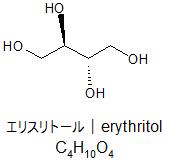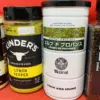エリスリトールの危険性と安全性評価【人工甘味料・食品添加物】

エリスリトールは、トウモロコシなどのでんぷんを発酵して生産される甘味料で、毒性、遺伝毒性、変異原性、発がん性はなく、飲料に対しては1.6%(16g/L)までは安全含有量とされており、一般的な食品添加物としての危険はありませんが、まれにアレルギー反応が出る方がいるため過剰摂取は控えましょう。
エリスリトールの化学的性質と詳細

エリスリトール(Erythritol|IUPAC:(2R,3S)-Butane-1,2,3,4-tetrol)は、別名エリトリトール、商標名Zerose、化学式C4H10O4、モル質量122.12g/mol、水への溶解度330g/L(20℃)の人工甘味料です。ショ糖の6割程度(60~70%)の甘さで、ショ糖よりも甘さ控えめです。
トウモロコシ等を酵母(Yarrowia lipolytica)で発酵させて得られる糖アルコールで、人工甘味料ではありますが、発酵に頼って生み出されているため比較的自然派です。グルコース(単糖)やショ糖にはカロリーがありますが、エリスリトールはカロリーがほとんどないことから、甘味は6割程度でカロリーゼロを実現できます。
日本では1990年に、アメリカでは2001年に(GRAS通知番号GRN000076)、EUでは2006年に(2006/52 / EC)安全な食品添加物であると認定されています。
エリスリトールの危険性評価
エリスリトールは人体にほとんど悪影響がなく、毒性、変異原性、発がん性ともに確認されていません。
The majority of the safety studies conducted were feeding studies in which erythritol was mixed into the diet at concentrations as high as 20%. The metabolic studies in animals have shown that erythritol is almost completely absorbed, not metabolized systemically and is excreted unchanged in the urine.
Erythritol administered orally to humans was rapidly absorbed from the gastrointestinal tract and quantitatively excreted in the urine without undergoing metabolic change. At high oral doses, urinary excretion accounted for approximately 90% of the administered dose with minimal amounts appearing in the faeces.
引用元:https://www.sciencedirect.com/science/article/abs/pii/S027869159800091X
上記の臨床試験では、食事のうち、エリスリトールを20%含むものを与えても人体には影響がなかったとされ、吸収されると、全身代謝されることなく、速やかに、その90%が尿として排泄され、残りの腸内に残るエリスリトールは腸内細菌によって発酵される事がわかっています。
Following a request from the European Commission, the EFSA Panel on Food Additives and Nutrient Sources added to Food (ANS) provides here a scientific opinion on the safety of erythritol (E 968) in light of the proposed extension of use of erythritol to be added at a maximum level of 1.6 % (16 g/L) as a flavour enhancer in non-alcoholic beverages.
引用元:https://efsa.onlinelibrary.wiley.com/doi/abs/10.2903/j.efsa.2015.4033
また、ヨーロッパのEFSA(European Food Safety Authority)では、非アルコール飲料の場合、エリスリトールの安全含有量は「1.6%(16g/L)」とされています。
大量摂取で下痢を引き起こす
The non-effective dose level, even in the case of more sensitive individuals, reaches 0.46 g/kg body weight for males and 0.68 g/kg body weight for females, compared to 0.37 g/kg and 0.42 g/kg, respectively, for xylitol. Additionally, more than half of tested individuals did not experience a laxative effect even after consumption of 50 g of erythritol [11].
引用元:https://www.tandfonline.com/doi/full/10.1080/07388551.2017.1380598
以下のエリスリトール摂取量を超えると下痢を起こす可能性が高い事がわかっています。
- 男性:0.46g/kg(体重50kgの場合は23g)
- 女性:0.68g/kg(体重50kgの場合は34g)
多くの治験者は50gのエリスリトールを経口摂取しても下痢にならなかったと報告されています。インスリン指数が低く済むため、糖尿病患者への砂糖代替品として十分期待できる食品添加物です。
このことから、安全摂取量の16g/Lを基準として考えた時、エリスリトールをこの基準ギリギリまで含んでいる飲み物を2L飲むと、
16g/L × 2L = 32g
となり、一部の方が下痢を引き起こす量を超えます。特に男性の場合は、この摂取量は下痢を引き起こしやすい量なため、アレルギーがないか、下痢を起こしやすい体質かどうか、また、下痢を起こしやすい飲み物(牛乳など)を一緒に摂取していないか確認したほうが良いでしょう。
アレルゲンの可能性あり
ごくまれにエリスリトールに対して、以下のアレルギー反応を示す人がいることが分かっています。
- 蕁麻疹(じんましん)
- 咳(せき)
- 浮腫(むくみ)
- 喘鳴(ぜんめい)
- 低酸素血症
このため、エリスリトールを含む食品を摂取して、これらの症状が出ている可能性がある場合には、早急に医師の診断を受けて、確証を得ましょう。
エリスリトールの安全性評価
エリスリトールは、血糖値、虫歯に関与しないため、糖尿病患者向けの甘味料としても活用が期待されているものです。ショ糖代替品として活用されるものであって、異常なほどに大量に摂取しない限り危険はありません。
天然の食物(きのこ、梨、ブドウ、スイカ)などの中で、自然に少量発生することもあるもので、発がん性もなく、遺伝毒性もないものです。
出典・参考
Erythritol: an interpretive summary of biochemical, metabolic, toxicological and clinical data
https://www.sciencedirect.com/science/article/abs/pii/S027869159800091X
Health effects of erythritol
https://link.springer.com/article/10.1007/s13749-014-0067-5
Erythritol: A Review of Biological and Toxicological Studies
https://www.sciencedirect.com/science/article/abs/pii/S0273230096900987
Scientific Opinion on the safety of the proposed extension of use of erythritol (E 968) as a food additive
https://efsa.onlinelibrary.wiley.com/doi/abs/10.2903/j.efsa.2015.4033
Recent advances in biological production of erythritol
https://www.tandfonline.com/doi/full/10.1080/07388551.2017.1380598
エリスリトール|オレオサイエンス|三菱化学フーズ
https://www.jstage.jst.go.jp/article/oleoscience/13/9/13_423/_pdf
指定添加物リスト|公益財団法人 日本食品化学研究振興財団 事務局
https://www.ffcr.or.jp/tenka/list/post-11.html
各添加物の使用基準及び保存基準|公益財団法人 日本食品化学研究振興財団 事務局
https://www.ffcr.or.jp/webupload/74a51493d997785a77ea40142cf05a79c6b52db7.pdf
食品添加物|厚生労働省
https://www.mhlw.go.jp/stf/seisakunitsuite/bunya/kenkou_iryou/shokuhin/syokuten/index.html
第二世代の糖アルコール
https://www.bfsci.co.jp/pdf/catalogue/03.pdf













